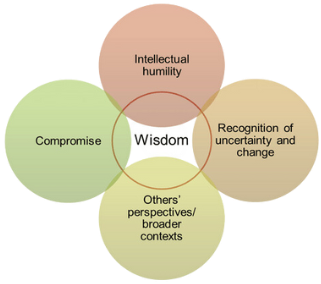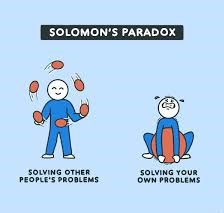While we tame Nature and send satellites to space or on other planets, our struggle to find ways and means to think and act wisely under trying circumstances, continues. In other words, we frequently get stumped in situations requiring clarity of thought leading to objective decision-making. And this seems so everyday phenomenon – during interactions with our partners, children, bosses, or even friends. But, why so? Why are we plagued with indecisiveness, rigidity, or egotism?
According to philosophers, one possible reason can be the strong attachment to our thoughts and beliefs. This impairs us from thinking wisely and acting prudently. So, the solution they offer lies in self-introspection. Is that a new theory? Interestingly, no.
“Knowing yourself is the beginning of all wisdom” - these were the words of Aristotle the great Greek philosopher who lived and died thousands of years ago.
So, we have known it for long but rarely practice. Instead, we remain self-obsessed with our thoughts, compromising our wisdom in the process.
If that sounds depressing, let me assure you, there is hope. This lies in Illeism - an ancient trick of thinking more wisely.

What is Illeism? Let’s explore…
The easiest way to understand Illeism is to listen to any speech delivered by the Indian Prime Minister, Mr. Narendra Modi. You will often find him referring to himself not in the first person. Instead, he uses the third person – Modi – to talk about himself… Modi’s beliefs, Modi’s thoughts, and Modi’s actions. And this exactly is Illeism – the act of speaking about yourself in the third person.
What does Illeism have to do with wisdom?

Well, we can find the answer in a study conducted by psychologist Igor Grossmann at the University of Waterloo in Canada. His first step was to ask his subjects to share a dilemma situation and then score them on parameters like intellectual humility, appreciating the perspective of others, recognizing uncertainty, and the ability to draw a compromise. In his opinion, these factors determine how equipped we are to deal with life challenges, and, therefore, are potent indicators of our emotional well-being and relationship quality compared to IQ tests.
Grossman’s next step was to find ways and means of improving these wise-reasoning scores. In this endeavour, he joined hands with Ethan Kross at the University of Michigan, US. As part of the experiment, he invited around 300 participants to describe a socially challenging situation every day in their lives for one month. Half of them were instructed to do it in the first person, while the other half had to do so in the third person.
As expected, the second group achieved higher scores. In other words, applying Illeism helped them fare better in terms of intellectual humility, perspective-taking, and compromising ability. Grossman termed this phenomenon Solomon’s paradox, after the name of the ancient Biblical king who wisely advised others but faltered miserably when making personal decisions.

Now the obvious question arises, how does Illeism contribute towards wiser reasoning?
The answer lies in the fact that adopting a third-person perspective helps you detach yourself from your own emotions and appreciate the other person’s perspective. This detachment allows you to take a distanced perspective and remain open to feedback.
For example, when Priya has a disagreement with her partner, she can adopt a third-person perspective while referring to herself. This means, phrases like “I believe”, “I think” etc. can be replaced with “Priya believes” or “Priya thinks”.
When caught in demanding situations with sinking confidence levels, you can even try talking to yourself in the third person. For instance, “Priya is very strong and confident. She can easily handle difficult situations. She is very calm and controlled. I love Priya. She is my dearest friend. God bless her. She is my true life partner…”
Do it with yourself and observe how you get less possessive of your thoughts and beliefs. It seems as if you are talking about someone else. It becomes so much easier to let go…
With emotions under control, you are better placed to appreciate the other viewpoint and acknowledge your limitations. This works as a major catalyst in downsizing your ego, eventually making you humbler. Consequently, you end up in more inclusive interactions and healthier relationships.
Put otherwise, practising Illeism in regular interactions provides a strong stimulus to a balanced response to day-to-day challenges.
Initially, it may sound daunting, but suggest you take baby steps. The short victories, eventually, will pave the way for long-term wins as you groom yourself into a well-rounded personality.
A word of caution!!!
Have you ever come across someone who is always empathizing with others and readily going on the back foot in any interaction? Well, that may be an extreme example of Illeism. Such personas end up bottling up their emotions within and turn up as nervous wrecks.
Overall, therefore, the secret lies in striking a balance, and being mindful of applying controls in measured doses.


